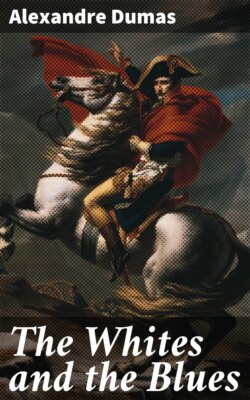Читать книгу The Whites and the Blues - Alexandre Dumas - Страница 27
На сайте Литреса книга снята с продажи.
SCHNEIDER'S JOURNEY
ОглавлениеTable of Contents
Scarcely had Charles and the men who were conducting him passed Schneider's door than it opened, and the Commissioner of the Republic came out, glanced tenderly at the instrument of death, packed neatly in a cart, made a slight sign of friendly greeting to Master Nicholas, and got into the empty carriage. Standing there for an instant, he said to Master Nicholas: "And you?"
The latter pointed to a sort of cab that was rapidly approaching which contained two men, his assistants; the cab was his own conveyance.
Everything was in readiness—the accuser, the executioner, and the guillotine.
The procession began its march through the streets leading to the Kehl gate, which opened on the road to Plobsheim. Everywhere they passed, terror, with its icy wings, passed also. Those who were standing at their doors went inside; those who were walking, hugged the walls and wished they could slip through them. A few fanatics alone waved their hats, and cried: "Long live the guillotine!" which meant, "Long live death!" but, to the honor of humanity, it must be admitted that these individuals were greatly in the minority.
Schneider's customary escort, eight of the Hussars of Death, were waiting for him at the gate.
In each village that Schneider came to on the road, he made a halt, striking terror into the hearts of the people thereby. As soon as the lugubrious procession had stopped in the public square, Schneider sent word that he was ready to listen to any denunciations that should be made to him. He heard the accusations, interrogated the mayor and the trembling municipal counsellors, ordered the arrests, and left the village behind him as sad and desolate as if it had been visited by the plague or the yellow fever.
The village of Eschau was to the right, and a little to one side of the road. Its inhabitants therefore hoped to be spared the terrible visitation. But they were mistaken.
Schneider turned into the crossroad, which was gullied by rain, through which his carriage and that of Master Nicholas passed easily, thanks to their light construction. But the cart which bore the red machine stuck fast in the mud.
Schneider sent four Hussars of Death to look after the men and horses. The men and the horses were somewhat delayed; the enthusiasm for this funereal work was not great. Schneider was furious; he threatened to remain permanently at Eschau and to guillotine the whole village. And he could have done so if he had chosen, so supreme was the omnipotence of these terrible dictators.
This explains the massacres of Collot-d'Herbois at Lyons, and of Carrier at Nantes. The lust of blood took possession of them, just as eighteen hundred years before it had taken possession of Nero, Commodus, and Domitian.
At last, with the combined efforts of men and horses, they succeeded in dragging the cart out of the ruts, and entered the village.
The mayor, his deputy, and the municipal counsellors were awaiting Schneider at the end of the street. Schneider surrounded them with his Hussars of Death without listening to a word they had to say.
It was market day; he stopped on the great square, and ordered the guillotine set up before the eyes of the terrified people. Then he gave the order to tie the mayor to one of the pillars of the guillotine, and the deputy to the other, while all the counsellors stood upon the platform. He had invented this sort of pillory for all those who in his opinion did not deserve the extreme sentence, death.
It was noon, and the dinner-hour. He entered an inn which was opposite the scaffold, had his table set on the balcony, and, guarded by four Hussars of Death, ate his dinner there.
At dessert he rose and lifted his glass, crying: "Long live the Republic! Death to the aristocrats!" When the spectators had repeated his cry, even those who were gazing at him in fear from the top of the scaffold, not knowing what was to be done with them, he said: "It is well; I pardon you."
And he ordered the mayor and his deputy to be untied, and permitted the municipal body to descend from the platform, commanding them, in the interest of "equality and fraternity," to help the executioner and his assistants to take down the guillotine and load it upon the cart, after which he made them escort him in triumph to the other end of the village.
They reached Plobsheim about three in the afternoon. At the first house Schneider asked the way to the dwelling of the Comte de Brumpt. They pointed it out to him.
He lived in the Rue de Rhin, the most spacious and pleasant street in the town. When they reached the house, Schneider ordered them to set up the guillotine before it, and leaving four hussars to guard the scaffold, he went away, taking the other four with him.
He stopped at the hotel of the "Phrygian Cap," formerly the "White Cross."
From there he wrote as follows:
To the citizen Brumpt at the town-prison:
Upon giving your written word of honor not to escape, you are free. But you will invite me to dinner to-morrow at noon, because I must talk to you on important business.
Euloge Schneider.
He sent the letter to the Comte de Brumpt by one of his hussars. Ten minutes later the man brought the answer:
I give my parole to the citizen Schneider to return to my own house, and not to leave it without his permission.
I shall be much pleased to receive him at dinner to-morrow, at the hour named.
Brumpt.
